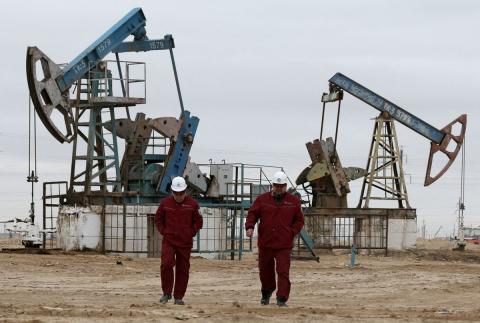
‘The demand side of the equation is back in focus’
Saudi Arabia has restored more than 75 percent of crude output lost after the attacks on its facilities
SINGAPORE: Oil prices eased on Tuesday as weak manufacturing data from Europe and Japan focused market attention on the gloomy outlook for demand and away from uncertainty around supply disruptions in Saudi Arabia.
Brent crude futures fell 35 cents to $64.42 a barrel by 0408 GMT, while US West Texas Intermediate (WTI) futures were at $58.36, down 28 cents.
“The demand side of the equation is back in focus,” said Michael McCarthy, senior market analyst at CMC Markets in Sydney, pointing to sluggish manufacturing numbers in leading economies in Europe as well as Japan.
“That’s why we’re seeing a little bit more (downward) pressure on Brent than West Texas at the moment.”
Still, oil prices remained at comparatively elevated levels for the year in the wake of the Sept. 14 attack on Saudi Arabia’s largest oil processing facility that halved output in the world’s top oil exporter.
Reuters reported that Saudi Arabia has restored more than 75 percent of crude output lost after the attacks on its facilities and will return to full volumes by early next week. But the Wall Street Journal reported on Monday that repairs at the plants could take months longer than anticipated.
“Nine days after the oil facility attack in Saudi Arabia (SA), we still see divergent market views on when the damaged supplies will be restored,” analysts at Nomura said in a note.
“While the damaged plants may be repaired in the next couple of weeks, increasing actual oil supplies may require monitoring.”
European powers — Britain, Germany and France — backed the United States in blaming Iran for the Saudi oil attack, urging Tehran to agree to new talks with world powers on its nuclear and missile programs and regional security issues.
Meanwhile a preliminary Reuters poll found on Monday that US crude oil and distillate stockpiles were expected to have dropped last week.
Seven analysts polled by Reuters estimated, on average, that crude inventories fell 800,000 barrels in the week to Sept. 20.
The poll was conducted ahead of key reports from the American Petroleum Institute, an industry group, to be released on Tuesday and from the Energy Information Administration on Wednesday.












